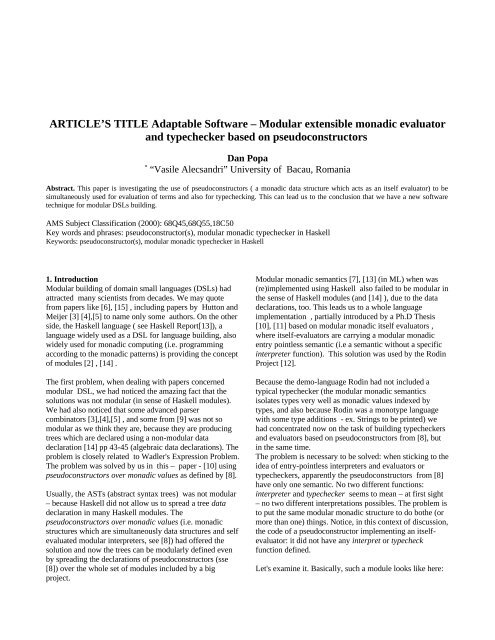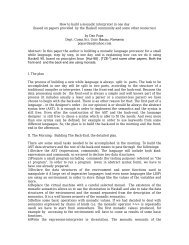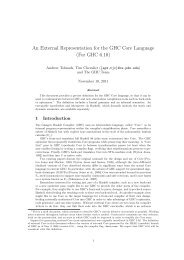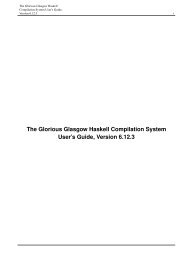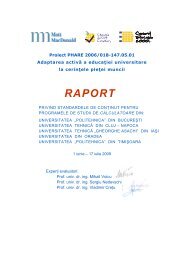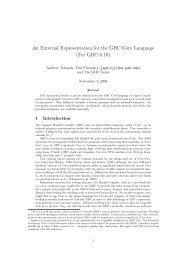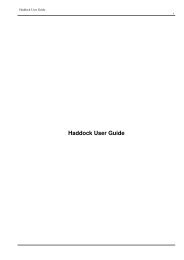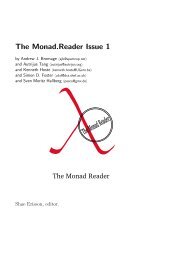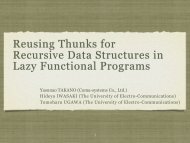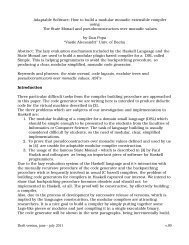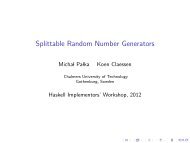Buletin stiintific 2008 - Haskell
Buletin stiintific 2008 - Haskell
Buletin stiintific 2008 - Haskell
Create successful ePaper yourself
Turn your PDF publications into a flip-book with our unique Google optimized e-Paper software.
ARTICLE’S TITLE Adaptable Software – Modular extensible monadic evaluator<br />
and typechecker based on pseudoconstructors<br />
Dan Popa<br />
*<br />
“Vasile Alecsandri” University of Bacau, Romania<br />
Abstract. This paper is investigating the use of pseudoconstructors ( a monadic data structure which acts as an itself evaluator) to be<br />
simultaneously used for evaluation of terms and also for typechecking. This can lead us to the conclusion that we have a new software<br />
technique for modular DSLs building.<br />
AMS Subject Classification (2000): 68Q45,68Q55,18C50<br />
Key words and phrases: pseudoconstructor(s), modular monadic typechecker in <strong>Haskell</strong><br />
Keywords: pseudoconstructor(s), modular monadic typechecker in <strong>Haskell</strong><br />
1. Introduction<br />
Modular building of domain small languages (DSLs) had<br />
attracted many scientists from decades. We may quote<br />
from papers like [6], [15] , including papers by Hutton and<br />
Meijer [3] [4],[5] to name only some authors. On the other<br />
side, the <strong>Haskell</strong> language ( see <strong>Haskell</strong> Report[13]), a<br />
language widely used as a DSL for language building, also<br />
widely used for monadic computing (i.e. programming<br />
according to the monadic patterns) is providing the concept<br />
of modules [2] , [14] .<br />
The first problem, when dealing with papers concerned<br />
modular DSL, we had noticed the amazing fact that the<br />
solutions was not modular (in sense of <strong>Haskell</strong> modules).<br />
We had also noticed that some advanced parser<br />
combinators [3],[4],[5] , and some from [9] was not so<br />
modular as we think they are, because they are producing<br />
trees which are declared using a non-modular data<br />
declaration [14] pp 43-45 (algebraic data declarations). The<br />
problem is closely related to Wadler's Expression Problem.<br />
The problem was solved by us in this – paper - [10] using<br />
pseudoconstructors over monadic values as defined by [8].<br />
Usually, the ASTs (abstract syntax trees) was not modular<br />
– because <strong>Haskell</strong> did not allow us to spread a tree data<br />
declaration in many <strong>Haskell</strong> modules. The<br />
pseudoconstructors over monadic values (i.e. monadic<br />
structures which are simultaneously data structures and self<br />
evaluated modular interpreters, see [8]) had offered the<br />
solution and now the trees can be modularly defined even<br />
by spreading the declarations of pseudoconstructors (sse<br />
[8]) over the whole set of modules included by a big<br />
project.<br />
Modular monadic semantics [7], [13] (in ML) when was<br />
(re)implemented using <strong>Haskell</strong> also failed to be modular in<br />
the sense of <strong>Haskell</strong> modules (and [14] ), due to the data<br />
declarations, too. This leads us to a whole language<br />
implementation , partially introduced by a Ph.D Thesis<br />
[10], [11] based on modular monadic itself evaluators ,<br />
where itself-evaluators are carrying a modular monadic<br />
entry pointless semantic (i.e a semantic without a specific<br />
interpreter function). This solution was used by the Rodin<br />
Project [12].<br />
Because the demo-language Rodin had not included a<br />
typical typechecker (the modular monadic semantics<br />
isolates types very well as monadic values indexed by<br />
types, and also because Rodin was a monotype language<br />
with some type additions - ex. Strings to be printed) we<br />
had concentrated now on the task of building typecheckers<br />
and evaluators based on pseudoconstructors from [8], but<br />
in the same time.<br />
The problem is necessary to be solved: when sticking to the<br />
idea of entry-pointless interpreters and evaluators or<br />
typecheckers, apparently the pseudoconstructors from [8]<br />
have only one semantic. No two different functions:<br />
interpreter and typechecker seems to mean – at first sight<br />
– no two different interpretations possibles. The problem is<br />
to put the same modular monadic structure to do bothe (or<br />
more than one) things. Notice, in this context of discussion,<br />
the code of a pseudoconstructor implementing an itselfevaluator:<br />
it did not have any interpret or typecheck<br />
function defined.<br />
Let's examine it. Basically, such a module looks like here:
arg1 … arg n =<br />
do { v1 >=k = Error s<br />
error s = Error s<br />
The meaning is usual: a finally computed value a,<br />
injected into the monad by return becomes a Success a.<br />
This is the result of a successful computation.<br />
The bind (>>==) between Success a and a second<br />
computation k is defined as k applied to a. So, we can<br />
compute the result by simply extracting a from (Success a)
and apply the (notice: monadic action) k. On the other<br />
side, an error produced by a computation should propagate<br />
and finally produce an error, as result of the whole<br />
computation.<br />
The result of computations is also made show-able, using<br />
also a custom instance of the Show class:<br />
instance (Show a) => Show (M a) where<br />
show (Success a) = "Success: " ++ show a<br />
show (Error s) = "Error :" ++ s<br />
6. The dual semantics<br />
Modular monadic interpretation can be implemented as a<br />
type class, which can also be instantiated as a typechecker.<br />
The class we had defined, (called “interpretare”) is<br />
including the following functions: if0, operator, constant,<br />
prj, pair, variable. Here it is, and it is based on the idea that<br />
semantics should not necesarry be a function from Values<br />
to Values than is usual, or a function from Values to M<br />
Values – as the functions are implemented in [15]. We<br />
considered that modular monadic semantics for the terms<br />
build by pseudoconstructors ([8]) should usually be a sort<br />
of function from m values to m values semantics – or<br />
usually a function from m types to m types (next column):<br />
class Interpretare typ where<br />
if0:: (Monad m) => m typ-> m typ-> m typ-> m typ<br />
operator :: (Monad m)<br />
=> (Int -> Int -> Int) -> m typ-> m typ-> m typ<br />
constant :: (Monad m) => Int -> m typ<br />
prj :: (Num t, Monad m) => t -> m typ-> m typ<br />
pair :: (Monad m) => m typ-> m typ-> m typ<br />
variable :: (Monad m) => String -> m typ<br />
Of course, in some special cases, like the simplest terms<br />
packaging other kind of data, the signature will not include<br />
only m type-s. If needed, the interface of the class can be<br />
extended. Here, we have just put a minimal collection. The<br />
word “typ” can be read as “type” which is a keyword in<br />
<strong>Haskell</strong>.<br />
7.The typechecker<br />
Starting from the class above, the implementation of the<br />
typechecker is strightforward. As a general case, all the<br />
subterms of a term, are itself-evaluated and the results are<br />
used by a fucntion (called f,here) to produce the final<br />
result, in this instance the computed type of the complete<br />
term.<br />
------------------------------------------------------ Code of the type-checker----------------------------------------------------------------<br />
instance Interpretare Type where<br />
if0 e1 e2 e3 = do { tau1
As a result of this definition we are able to evaluate the<br />
types of terms by simply typing the terms in the interactive<br />
mode of hugs or ghci, and specifying That we are<br />
interested in types. In the folowings line, the list monad is<br />
used as support for the do-notations but other monads can<br />
also be used (try the Maybe Monad – for example).<br />
8.The evaluator<br />
A standard evaluator, in this case using a dummy<br />
environment – but it can be replaced by a real one - is also<br />
writable as an instance of the previous class. Notice (by<br />
missing ) the absence of interpreter or typechecker nominal<br />
functions.<br />
instance Interpretare Value where<br />
constant i = return (Num i)<br />
variable v = return (g v) -- dummy lookup function<br />
where<br />
g "x" = (Num 1)<br />
g "y" = (Num 2)<br />
if0 e1 e2 e3= do{v0
Main> (if0 (constant 1) (variable "x")<br />
(variable "y")) ::[Type]<br />
[MyInt]<br />
The reader is invited to use ghc instead of hugs, to try other<br />
terms and even give a complete formal proof that this<br />
implementation can type and evaluate all of the terms built<br />
by this set of pseudoconstructors. Also he or she should<br />
notice: the monad of Successful and Errors computations is<br />
not necessary needed by this kind of solutions, but can be<br />
included as a part of it.<br />
References<br />
[1] Louis Julien Guillemette, Stefan Monier, Type Safe<br />
Code Transformation in <strong>Haskell</strong>, Univ. of Montreal,<br />
Electronic Notes in Theoretical Computer Science, Elsevier<br />
Science, 174 (2007) 23-39<br />
[2] Hudak Paul, Peterson John, Fasel Joseph – A Gentle<br />
Introduction to <strong>Haskell</strong> 98, Yale University, Los Alamos<br />
Laboratory, 1999<br />
[3] Hutton, Graham; Meijer, Errik; Monadic parsing in<br />
<strong>Haskell</strong>; Journal of Functional Programming 1 (1): 1-000,<br />
1993, Cambridge University Press<br />
[4] Hutton, Graham; Meijer, Errik; Monadic Parser<br />
Combinators - “Technical report NOTTCS-TR-96-4 Dept.<br />
Comp Sci Univ,. Nottingham – 1996<br />
http://www.cs.nott.ac.uk/Department/Staff/gmh/monparsin<br />
g.ps<br />
Ştiinţifice, Seria Matematică, Univ. Bacău, (18) <strong>2008</strong>, pp<br />
pag. 233 – 248<br />
http://www.haskell.org/wikiupload/7/7d/POPA_D.pdf<br />
[11] Popa, Dan ; Metode si tehnici de realizare a<br />
interpretoarelor adaptabile, Univ. “Al.I.Cuza” Iasi, 2010<br />
[12] The Rodin Project<br />
http://www.haskell.org/haskellwiki/Rodin<br />
http://www.haskell.org/haskellwiki/RodinEn<br />
[13] Zine-el-Abidine Benaisa, Emir Pasalic; DSL<br />
Implementation using staging and monads, Pacific<br />
Software Research Center, Proceedings of DSL'99: The<br />
2nd Conference on Domain-Specific Languages , Austin,<br />
Texas, USA, October 3–6, 1999<br />
http://www.usenix.org/events/dsl99/full_papers/sheard/she<br />
ard.pdf<br />
[14] Peyton Jones, Simon (editor); <strong>Haskell</strong> 98 Language<br />
and Libraries The Revised Report, Cambridge University<br />
Press (May 5, 2003)<br />
http://haskell.org/definition/haskell98-report.pdf<br />
[15] Wadler, Philip; The essence of functional<br />
programming, The 19 th Symposium on Principles of<br />
Programming Languages,ACM, Albuquerque, New<br />
Mexico, 1992<br />
[5] Hutton, Graham; Meijer, Errik; Monadic parsing in<br />
<strong>Haskell</strong>; Journal of Functional Programming 8(4): 437-<br />
444,Jully 1998<br />
http://www.cs.nott.ac.uk/Department/Staff/gmh/bib.html#p<br />
earl<br />
[6] Ivanovik, Mirjana; Kuncak, Viktor; Modular Language<br />
Speciffications in <strong>Haskell</strong>; Institute of Mathematics,<br />
University of Novi Sad, Yugoslavia, 2000<br />
[7] Liang S , Hudak P., Jones M. Monade transformers and<br />
modular interpreters, POPL'95. ACM Press,1995<br />
[8] Pseudoconstructors over monadic values<br />
http://www.haskell.org/haskellwiki/Pseudoconstructors_ov<br />
er_monadic_values<br />
[9]Popa Dan; Practica Interpretarii Monadice, Matrix<br />
Rom Publishing House, <strong>2008</strong><br />
[10] Dan Popa, Modular evaluation and interpreters using<br />
monads and type classes in <strong>Haskell</strong> , Studii si Cercetări


